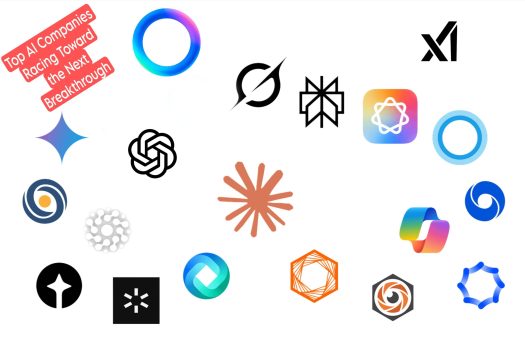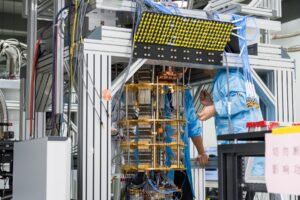 Pin
Pin Photo by horizondwellers
Silicon Valley’s most valuable minds are getting phone calls they can’t ignore. Meta is writing checks with more zeros than most people see in a lifetime, all to build what Mark Zuckerberg calls his “super intelligence team.” The social media giant isn’t just hiring—they’re conducting a calculated raid on the world’s brightest AI researchers.
This isn’t your typical corporate hiring push. Meta is targeting the architects of breakthrough algorithms, the visionaries who’ve spent years at Google DeepMind, OpenAI, and Anthropic. Each recruitment represents millions in signing bonuses, stock options that could buy small countries, and promises of unlimited research budgets.
The stakes couldn’t be higher.
While other tech giants debate AI safety and gradual development, Meta is betting everything on speed. Their message is clear: whoever builds artificial general intelligence first will reshape human civilization. And they’re willing to pay any price to ensure it’s them.
Table of Contents
The Science Behind the Spending Spree
Meta’s recruitment strategy reveals a deeper truth about artificial intelligence development. Building AGI isn’t just about having powerful computers or massive datasets—it’s about assembling the rare combination of theoretical brilliance and practical engineering expertise that exists in perhaps a few hundred people worldwide.
The company is specifically hunting for researchers who understand transformer architectures, neural scaling laws, and reinforcement learning from human feedback. These aren’t just buzzwords—they’re the fundamental building blocks that separate today’s impressive chatbots from tomorrow’s truly intelligent systems. Meta knows that each expert they hire isn’t just an addition to their team; it’s a subtraction from their competitors.
What makes this arms race particularly intense is the winner-take-all nature of AGI development. The first company to achieve artificial general intelligence won’t just have a competitive advantage—they’ll have the power to rewrite entire industries overnight. Meta’s willingness to spend billions on talent reflects their understanding that in this race, second place might as well be last place.
The Names Behind the Nine-Figure Numbers
The numbers sound like lottery winnings, not salaries. Reports of $200 million and $300 million compensation packages are rattling the Valley. One social media post even claimed Meta offered a potential AI hire \$1.25 billion over four years—though the person apparently still said no. These aren’t just job offers; they’re financial earthquakes reshaping Silicon Valley’s talent landscape.
Meta’s biggest coup came when they landed Shengjia Zhao, one of ChatGPT’s co-creators, as chief scientist of their new Superintelligence Labs. The company also successfully recruited multiple former OpenAI researchers, including Jiahui Yu, Shuchao Bi, and Hongyu Ren, plus Google DeepMind’s Jack Rae. One investor saw an AI researcher get—and turn down—an $18 million job offer from Meta, choosing instead to join Mira Murati’s buzzy new startup.
Not every recruitment succeeded. OpenAI’s Sam Altman publicly claimed Meta was offering his employees \$100 million signing bonuses, though some top researchers chose to stay put despite the astronomical offers. Meanwhile, Elon Musk’s xAI is taking a volume approach, hiring thousands of “AI mentors” to train their Grok system—proving there are multiple ways to win the intelligence race.
The Battle Lines Are Drawn
The AI arms race has transformed into a three-way war between tech titans with radically different philosophies. OpenAI maintains their cautious approach, insisting that safety protocols and gradual releases protect humanity from uncontrolled artificial intelligence. Their strategy focuses on incremental improvements while building robust safety measures into every system they develop.
Google DeepMind plays the long game, leveraging their massive computational resources and decades of research experience. They’re betting that methodical, science-driven development will ultimately triumph over flashy startups and reckless spending. Their AlphaFold protein-folding breakthrough proves they can deliver world-changing results when they take their time to get things right.
Meta has chosen the most aggressive path: spend whatever it takes, hire whoever you need, and build AGI faster than anyone thought possible. Zuckerberg’s vision extends beyond social media into a future where Meta’s AI systems power everything from virtual reality worlds to scientific breakthroughs. Their willingness to write nine-figure checks suggests they believe the winner of this race won’t just dominate technology—they’ll define the next chapter of human civilization.
Why the Rush Could Change Everything
The urgency driving these billion-dollar bets stems from a simple but terrifying reality: artificial general intelligence isn’t decades away anymore. Industry insiders whisper about breakthrough moments happening in private labs, algorithms that display reasoning abilities that shouldn’t exist yet. Every month of delay could mean watching a competitor cross the finish line first.
Meta’s aggressive timeline reflects Zuckerberg’s belief that AGI will arrive by 2030, maybe sooner. This isn’t just about building better chatbots or improving ad targeting. The company that achieves AGI first will possess technology capable of solving climate change, curing diseases, and automating entire economies. The economic moat would be so vast that catching up might become impossible.
The human cost of this race is already visible in Silicon Valley’s talent shortage. Smaller AI companies can’t compete with Meta’s compensation packages, potentially stifling innovation in favor of consolidating genius at a few mega-corporations. Yet the alternative—letting another nation or company reach AGI first—feels even riskier. In this winner-take-all game, Meta has decided that spending billions today is cheaper than losing trillions tomorrow.
The Future Belongs to the Bold
The AI race has entered its final phase, and Meta’s billion-dollar gamble represents more than corporate strategy—it’s a bet on the future of human civilization. While competitors debate ethics and safety measures, Zuckerberg is assembling the most expensive think tank in history. Every researcher they hire, every algorithm they develop, brings us closer to a world where artificial intelligence surpasses human capability.
The ripple effects extend far beyond Silicon Valley. Universities are losing their brightest professors to tech giants offering packages worth more than entire research departments. Governments worldwide are scrambling to develop AI policies for technology that doesn’t exist yet but could arrive within years. The companies leading today’s race will likely determine whether AGI serves humanity or controls it.
History will remember this moment as the turning point when artificial intelligence stopped being science fiction and became an inevitable reality. Meta’s willingness to spend unprecedented sums on talent reveals their confidence that this race has a winner—and they’re determined it will be them. The question isn’t whether AGI will arrive, but which company will control it when it does.
FAQs
Meta is offering compensation packages worth \$200-300 million, with some reports claiming offers as high as \$1.25 billion over four years. These aren’t just salaries—they’re financial earthquakes reshaping Silicon Valley.
Meta landed Shengjia Zhao (ChatGPT co-creator) as chief scientist, plus researchers Jiahui Yu, Shuchao Bi, and Hongyu Ren from OpenAI, and Jack Rae from Google DeepMind. Not everyone said yes—some turned down $18M offers.
Zuckerberg believes AGI will arrive by 2030. The first company to achieve artificial general intelligence won’t just have a competitive edge—they’ll control technology that could reshape entire civilizations.
While Meta poaches individual superstars with massive packages, xAI is hiring thousands of “AI mentors” to train their Grok system. It’s quality versus quantity in the intelligence race.
The company that achieves AGI first will possess technology capable of solving climate change, curing diseases, and automating economies. The winner could define the next chapter of human civilization.
































